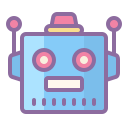3-5 Computer Science Curriculum
(View Complete Item Description)SFUSD's creative computing curriculum introduces computer science as a creative, collaborative, and engaging discipline to children in third through fifth grade. Across 15-20 lessons at each grade level, students will learn about algorithms and programming, computing systems, the Internet, and impacts of computing, while developing strong practices and dispositions. Lessons are designed to be implemented in 45 to 60-minute periods approximately once per week.
Material Type: Activity/Lab, Full Course, Lesson

















